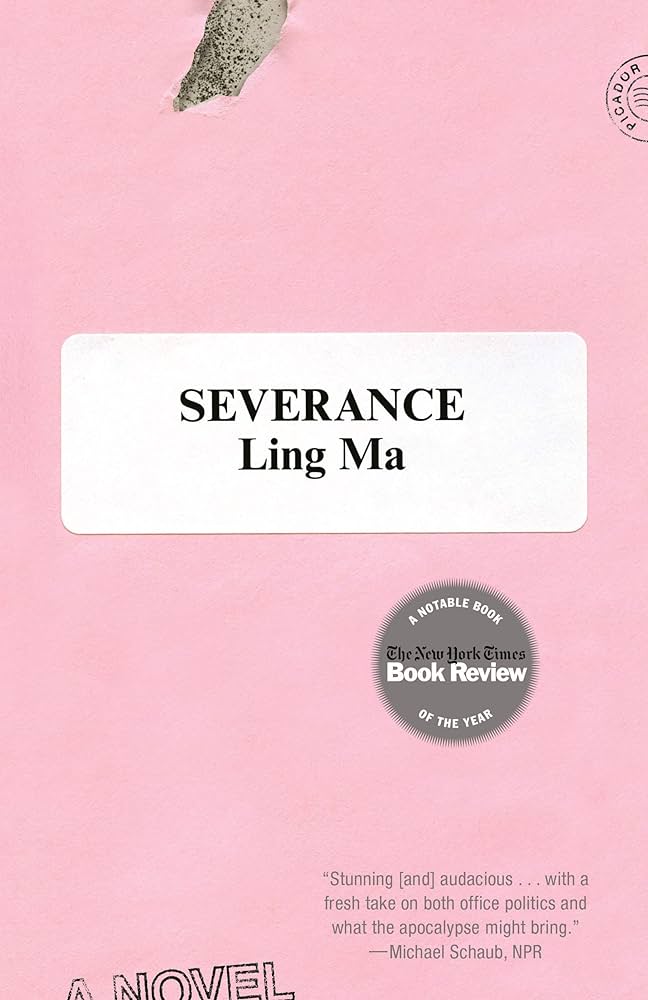“One zombie can be easily killed, but a hundred zombies is another issue […] This narrative, then, is not about any individual entity, per se, but about an abstract force: the force of the mob, of mob mentality”.
ma, 29
Ideas of survival and the collective are foregrounded; both are central to Ma’s post-apocalyptic novel Severance(2018). Whilst hinting at notions of survival, Ma’s repetition of “mob” emphasises an element of susceptibility alike a herd mindset, whilst also harking towards brutal competitiveness (29). As Monbiot establishes in How Did We Get Into This Mess?, “competition and individualism, in other words – is the religion of our time” (10). Aided by Western capitalist culture, individualism – exacerbated by self-gratification and a strand of self-serving personal autonomy – have become the supreme ethos. Severance offers an at times morbid reflection of this illusionary notion of individualism. Instead, Ma suggests that the waring notion of the ‘individual’, is not actually ‘individual’ at all – and is alternatively, a composition of the collective.
Shen Fever, an apocalyptic virus and seminal motif within the text, prospers under fundamentals of late capitalism: oblivion and repetition. Ma’s use of repetitive, forceful sentences, alike “I got up. I went to work in the morning. I went home in the evening” (150). As such, suggesting that for Candance to follow a routine, other than this, would be mindless.
Initially, Jonathan, operates as a polarity to Candace the office drone –
“Jonathan didn’t work in the nine-to-five sense. He did odd freelance gigs here and there so that he could spend most of his time writing […] Obviously, Jonathan kind of despised what I did. Maybe I did too”.
Ma, 10-12
Whilst Jonathan refuses to be a cog within the system, he subsequently suffers, alike Candace.

For Candace, working at Spectra, as a “Senior Product Coordinator of the Bibles division”, offers safety; yet safety is in exchange of self-fulfilment (Ma, 22). As Ma notes “the Bible embodies the purest form of product packaging, the same content repackaged a million times over, in new combinations ad infinitum” (23). Spectra have tapped into a nuanced market, one which is extraneously hyper-specific. Ma furthers the notion of hyper-individualism. Returning to Monbiot’s suggestions; capitalism enacts competition and individualism, whilst situating citizens as consumers (10). Individuality hinges on a desire to become a trailblazer; consumers seek out extremely niche products, alike those who purchase the Bible’s produced by Spectra. Ma writes that the Bible is “repackaged a million times”; the desire to have something unique is not truly satisfied (23). Ma furthers the waring notion of ‘individualism’, one which is repackaged and distributed to the masses. Individuals are situated within the cycle of consumption, paralleling the guise of which individuals- turned-meek zombies are lured under.
In addition to the unyielding nature of consumerism, individuals are governed by circumstance, i.e., capitalism, and its fixation on draining labour. Fisher writes in Capitalist Realism (2008),
“Capital is an abstract parasite, an insatiable vampire and zombie make; but the living flesh it converts into dead labour is ours, and the zombies it makes are us”.
15
Ma’s narrative raises the question, is it possible to ‘sever’ ties and exist outside the ant farm, or rather, the zombie farm?
Whilst operating within the ‘ant farm’ in terms of labour and consumer culture, Candance is immune from becoming a zombie. She is positioned as an outsider. Bob questions Candace’s place within the group, stating “Do you think we’re the right fit for you?” (Ma, 32). Here, Ma situates Candace’s position within the band of survivors as something unstable, in an already precarious environment. In doing so, Ma harks towards ideas surrounding identity and migration.
“Shen Fever being a disease of remembering, the fevered are trapped indefinitely in their memories”.
Ma, 160

Shen Fever is triggered by nostalgia – feelings of belonging are dangerous. Alike Ma, Candace immigrated to the US from China at a young age. Both of Candace’s parents have died, exacerbating her already detached relationship with China. Yet, Candace’s relationship with New York is also fraught. Ma writes “New York has a way of forgetting you” (151). Candace’s parted relationship with New York is further reflected in the name of her blog, “NY Ghost” (14). Candance is positioned as an outsider and an observer. As such, reflecting the ‘othering’ of immigrants. As Powell notes in ‘Us vs them’, othering “is largely driven by politicians and the media, as opposed to personal contact. Overwhelmingly, people don’t ‘know’ those that they are Othering” (n.p). The harmful sentiment which renders certain identities, i.e., East Asian / Asian Americans, as non-viable.

Ma humanises the reality of those who are continually ‘othered’, centring fiction as a means of breeding empathy. Fiction, alike Ma’s, explores the pathology of different identities and existences. Within ‘The Doom and Glory’, James Baldwin writes, “It was books that taught me that the things that tormented me most were the very things that connected me with all the people who were alive, or who had ever been alive” (n.p). By depicting the experience of the daughter of 1st generation immigrants, Ma humanises the experience. Fiction refutes the weaponizing of migrants’ identities. Whilst individuals are forged as a mass, Severance recognises the individuality of experience. Yet, Ma encourages the fostering of a unifying empathetic connection, through the recognition of multiplicity.
Ultimately, Ma dispels the capitalist-led and bred notion of individualism, and instead favours a more empathetic, collective, and restorative stance.
Word Count: 999
Bibliography
Primary Resources
Ma, Ling. Severance. 2018. Text Publishing. 2020. Print.
Secondary Resources
Baldwin, James. ‘The Doom and glory of Knowing Who You Are’. Life Magazine, May 24, 1963.
Fan, Jiayang. “Ling Ma’s “Severance” Captures the Bleak, Fatalistic Mood of 2018.” The New Yorker, 10 Dec. 2018, www.newyorker.com/books/under-review/ling-ma-severance-captures-the-bleak-fatalistic-mood-of-2018. Accessed 20 Nov. 2023.
Fisher, Mark. Capitalism Realism: Is There No Alternative? 2009. Zaro Books. pp.15. Print.
Monbiot, George. How Did We Get Into This Mess? Politics, Equality, Nature. New Left Books, 2016. Print.
Powell, John A. “Us vs Them: The Sinister Techniques of “Othering” – and How to Avoid Them.” The Guardian, The Guardian, 30 Nov. 2017, www.theguardian.com/inequality/2017/nov/08/us-vs-them-the-sinister-techniques-of-othering-and-how-to-avoid-them. Accessed 20 Nov. 2023.
“Shen Fever being a disease of remembering, the fevered are trapped indefinitely in their memories”.
I love your point on this Laura. Shen fever is a memory trap, triggered by reminiscing in places of nostalgia, happiness, home. Candance does not truly have a home. Candece’s only identity is a consumer, she has no feeling of place, home and even during the pandemic all she wants to do is go to work and into the office. There is this need for work and routine. Her life before in New York seems unfulfilling, her life moves with no real reason. Every sense of herself is detached from the self.
I really like your inclusion of the James Baldwin quote:
“It was books that taught me that the things that tormented me most were the very things that connected me with all the people who were alive, or who had ever been alive”
Books as a space of identification and humanising, as you put it, is an interesting motif to explore within this novel. I find it odd that Candace’s job is to repackage not just a book but the Bible for mass consumerist pursuits. However, I think this notion of the connection from books is played with by Ma as we can see from the scene with the little girl wherein Candace finds a bible and then attempts to hide the little girl to save her. Ma could be positing that idea that books instil empathy and humanise breaking the individualism of mass consumer culture. The search for identity is dispelled by a recognition of others. In an otherwise pessimistic novel this scene stands out to me as a moment of kindness.
Thank you for your comment! I think the thought you pose regarding the notion that books instil empathy and disrupt the individualism of mass consumer culture rather interesting. I wonder whether there are limitations to Ma’s attempt to do so; the mass production of her text means that she is inherently involved within consumer culture. Is it possible to negate the levels of individualism that are conducive within this aspect of culture?
Great post on zombies, herd-mentality, individualism, consumption – and migration and belonging! You cover a lot of ground and I like the visuals: the zombies I could figure out but what about poor Nick Kyrgios? Ma’s novel is definitely interested in the complex relationship between individuals and the herd – think about the easy slippage from ‘live stalk’ to livestock and the implications of shooting people once they are fevered and surplus to requirements. One becomes an individual through consumption, Ma seems to want to tell us with no small amount of irony, but whether other conceptions of individualism are available in the context of captialism and/or the pandemic is up for grabs? Here I liked your thoughts on belonging and nostalgia and how Candace is protected by her clear-eyed reckoning with her own past. But where does this leave her and us? What hope for the kind of collective life post-pandemic especially when the group of survivors are so ensnared by Bob’s ‘shoddy ideology’? The idea that she might be a carrier of the disease without actually being infected herself is intriguing. I wonder what kind of metaphorical work this does? Do you see hope in the ending? This emphasis on a ‘more empathetic, collective, and restorative stance’? I just see bleakness – but that probably says more about me.
Laura, I find your take on Ma’s work really insightful and interesting. You crucially discuss the importance of the narrative of immigrant identity that is fundamental to the novel. I thought your analysis of the bible in terms of its reproduction as an allegory for a ‘notion of “individualism” repackaged and distributed to the masses’ to be particularly interesting, and within this sense of repackaged individualism there exists a sense of consumer culture which attempts to sustain individualism through the constant purchasing of goods. I thought the discussion of othering was very well done, and how this functions through the setting of a pandemic. I wonder if there is a discussion to be had about the sense of immigrant othering in a pandemic that we can use to reflect on the Covid-19 pandemic. Especially at the beginning of the pandemic I recall a distinct movement of blame and hatred towards Asian immigrants. Although written pre-pandemic, Ma astutely points out the sense that even through collective experience (pandemic) racism and othering will persist.